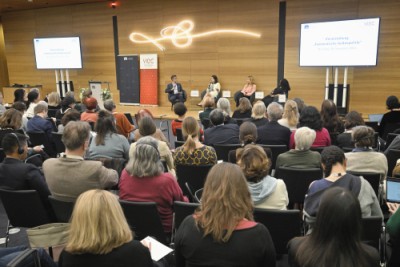Feminist Foreign Policy in Focus: Experts Discuss New Perspectives in Austria's Parliament
The Austrian Parliament hosted an important panel discussion on "Feminist Foreign Policy", where experts emphasized the need for a change of perspective in international politics.
 Moderator Markus Müller-Schinwald, former Foreign Minister of Sweden Ann Linde, Co-CEO Centre for Feminist Foreign Policy Kristina Lunz, Chair in Global Politics University of Manchester Toni Haastrup (f.l.t.r.). / Picture: © Parlamentsdirektion/Johannes Zinner
Moderator Markus Müller-Schinwald, former Foreign Minister of Sweden Ann Linde, Co-CEO Centre for Feminist Foreign Policy Kristina Lunz, Chair in Global Politics University of Manchester Toni Haastrup (f.l.t.r.). / Picture: © Parlamentsdirektion/Johannes Zinner
Sweden, which was the first country to introduce a feminist foreign policy in 2014, served as a point of reference. This policy focuses on women and marginalized groups and questions existing power relations. Although Sweden has moved away from this approach following a change of government, the concept remains relevant in other countries.
The discussion, moderated by Markus Müller-Schinwald (Ö1), included contributions from Ann Linde, former Swedish Foreign Minister, Kristina Lunz, co-founder of the Center for Feminist Foreign Policy (CFFP) in Berlin, and Toni Haastrup, a political scientist at the University of Manchester. The experts highlighted the differences between traditional and feminist foreign policy and discussed their potential to promote sustainable conflict resolution and secure peace.
The event was organized by the Vienna Institute for International Dialogue and Cooperation (VIDC) in cooperation with the Second President of the National Council Doris Bures. Bures, who took part via video message, emphasized the increase in armed conflicts worldwide and how women are particularly affected by these conflicts. She called for a new approach to foreign policy that integrates feminist principles.
Sybille Straubinger from the VIDC explained that feminist foreign policy is aimed in particular at violence against women and peacebuilding. Research shows that states with higher gender equality have a lower propensity to violence and that the involvement of women in peace processes increases the likelihood of sustainable solutions.
Ann Linde shared her experiences and emphasized the importance of a "gender lens" in politics. She emphasized that rights, representation, and resources were central pillars of the Swedish approach. Linde argued for a systematic application of feminist foreign policy as a method for developing solutions.
Kristina Lunz from the CFFP argued that sustainable peace is only possible by overcoming patriarchal structures. She emphasized the historical role of women's rights activists in the fight against violence and the importance of moving away from a purely "hard security policy".
Toni Haastrup emphasized the need to empower women, especially in the global South. She warned against shifting one's own values in times of crisis and emphasized the role of the media in prioritizing crises.
Finally, the experts discussed the importance of including women's perspectives in the development of the Austrian Security Strategy. They emphasized the importance of gender analysis in military operations and the inclusion of civil society, especially feminist representatives, in political processes.



